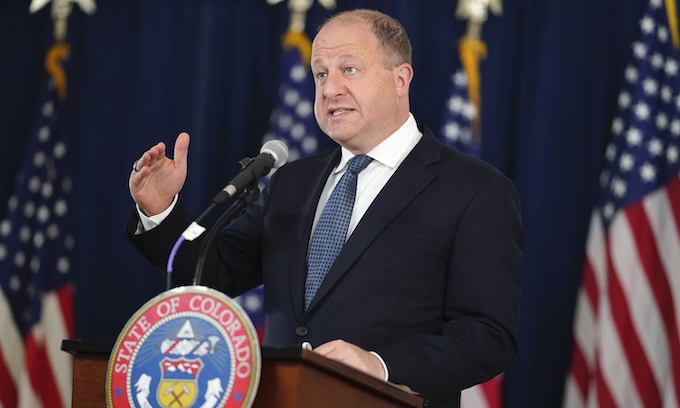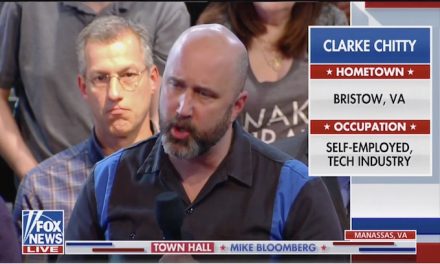A state senator has called for an investigation into whether Democrat Gov. Jared Polis personally profited from legislation he signed, including Colorado’s legalized sports books, and whether state agencies have promoted his real estate interests, The Gazette has learned.
In a stinging six-page letter sent Tuesday to the Legislative Audit Committee of the General Assembly, Sen. Jerry Sonnenberg pointed out a number of Polis’ “real and actual conflicts of interests that are going unchecked and are unaccountable.” He called for changes to state law that would require more detailed disclosures of the governor’s business interests.
Sonnenberg, R-Sterling, also said Polis has not fulfilled a campaign promise to place his business interests into a blind trust to avoid the appearance of impropriety or personal gain, as Sen. John Hickenlooper did when he served as governor and Denver’s mayor.
“The Colorado Governor takes unilateral actions that affect Colorado businesses and industries,” Sonnenberg wrote committee chairman Sen. Jim Smallwood, R-Parker. “… The Colorado Governor wields enormous power to benefit or impede Colorado businesses. At the same time, Gov. Polis holds substantial business interests that are directly and indirectly impacted by his official actions as governor.”
Polis’ office said any assertion that he is active with any business venture is “patently false.”
“The governor is now solely focused on giving back to the state he loves through public service and does not actively engage in business during his time of service; any assertion otherwise is patently false,” his office said in an emailed statement. “He also files his financial disclosure regularly to inform the public of his assets, and also has a blind trust that he set up in 2009.”
The statement did not say if the blind trust contained all his business assets or just some of them, and financial filings were unclear on the matter.
“The governor is focused on saving Coloradans money and protecting their freedom, and it’s unfortunate to see an attempt by a legislator to use taxpayer-funded resources for a blatant partisan attack,” the statement read. “The governor strongly supports and would proudly sign greater disclosure requirements for all elected officials, including the governor.”
The Legislative Audit Committee is an eight-member bipartisan panel that reviews and releases audits by the Office of the State Auditor, but can also request special studies. Its next meeting is scheduled for Sept. 28. Messages to committee members and staff were not immediately returned.
The committee is sometimes asked to look into the actions of elected officials. For instance, the committee was asked in December 2019 to authorize an inquiry into whether Hickenlooper had misused a federal fund meant for helping the state economy, instead using it to pay for his defense of possible ethics violations. The committee voted along party lines to refuse the request.
Relying on financial disclosures Polis made while serving in Congress, Sonnenberg said the governor personally owned stock in FanDuel from at least 2015 through May 2019 when he signed House Bill 19-1327, legislation that put the legalization of sports gaming before Colorado voters later that year.
Just after Polis signed the bill to authorize the ballot initiative, FanDuel made a $250,000 contribution to pass what became known as Proposition DD. More than 51% of the voters approved the measure.
Additionally, HB 19-1327 gave the state’s gaming commission the authority to create rules to oversee sports gambling and Polis has named all its members since taking office. One of them, according to Sonnenberg: Shawn Coleman, a former congressional staffer to Polis and a registered lobbyist.
FanDuel was granted its Colorado gaming license in March 2020.
Although Polis disclosed to the U.S. House of Representatives in September 2015 that he had invested between $1,000 and $15,000 into FanDuel a month earlier — a stake he said he still owned when he left Congress to become governor here in January 2019 — Polis has never divulged the investment in any financial disclosures required in Colorado, records show. It’s unclear if Polis is still invested in FanDuel or when it might have been sold.
Polis filed his final financial disclosure to Congress in April 2019 — four months after he was sworn in as Colorado governor — showing the FanDuel investment, but did not disclose the holding in any of his state financial filings previous to that, Sonnenberg noted.
“Governor Polis’ financial interest in FanDuel is not available to the general public but was purchased through venture-capital offerings typically characterized by high risk and high reward,” Sonnenberg wrote. “As an early investor in FanDuel, Polis stood to make an enormous profit off of this company that benefited from HB 19-1327 and is regulated by his appointed commission.”
Polis’ FanDuel investment was through SK Ventures, a Florida-based early-stage investing private equity fund that manages the investments of its clients, according to federal filings. Polis has held a stake in SK Ventures since at least 2011, filings show. Disclosures show Polis’ stake in SK Ventures was heavily invested in the emerging sports betting industry.
Polis again disclosed the stock ownership in 2019 as he was leaving Congress. SK Ventures shows FanDuel among the investments it has withdrawn from on its website, but does not indicate when that occurred. Emails to the venture firm were not returned.
Polis’ current financial disclosures do not show whether he still holds the stock and his office previously refused a Gazette request for confirmation, saying his disclosure reports meet the state’s requirements.
“The governor has complied with the comprehensive state statutory requirements for annual financial disclosures, and we don’t have any additional formal information beyond the disclosure forms,” his spokesman, Conor Cahill, wrote in an email.
Sonnenberg said Polis should come clean.
“The fact that these clear conflicts of interest occurred without state disclosure demonstrates the scope of the problem,” Sonnenberg wrote the committee. “To maintain public trust, Colorado citizens deserve a minimum level of transparency that discloses when a state public official is taking official actions that directly impact that official’s personal financial interests.”
Sonnenberg said so little is known about the breadth of Polis’ business interests — and state laws don’t mandate that he share all of what he owns and with whom he’s partnered — that there is virtually “no transparency” to determine how much he might have profited.
“This committee should review whether Gov. Polis’ substantial state business interests have created a conflict of interest with his role as governor or if additional disclosure requirements are necessary to reveal such conflicts,” Sonnenberg wrote.
Sonnenberg also noted how Polis is managing partner of Gunpark Property, a real estate investment group that, among other assets, owns a $23.8 million industrial building on Spine Road in Boulder.
That property was marketed and promoted for lease in August 2021 by the state Office of Economic Development and International Trade, according to a website capture of the offering that was included with Sonnenberg’s letter.
That agency is part of the state executive branch and its board is appointed by Polis.
“Gov. Polis has control over a state agency that marketed a commercial property that he owns,” Sonnenberg wrote.
Polis’ business interests are vast, according to various congressional and state financial disclosure statements required by law, holding or managing investments worth millions of dollars in more than two dozen entities.
When Polis ran for governor in 2018, he told journalists he would step away from those business interests if voters put him in the state Capitol.
“If I’m elected governor, I’d be happy to step down from any other roles I have in any other companies because being governor is a full-time job that will represent 110% of my efforts every day,” Sonnenberg quoted Polis as having said.
Financial filings required to be submitted by the governor show “Polis has taken on more active responsibilities directing his various companies and investment holdings than ever before,” Sonnenberg wrote.
“When comparing his filings from his time in Congress to governor, Gov. Polis is now sharing less information about his company and holdings in private equity funds, real estate and other ‘special opportunity fund’ investments,” Sonnenberg wrote, “despite the fact that as governor he has a far greater risk of taking official actions that financially benefits his private business interests.”
___
(c)2022 The Gazette (Colorado Springs, Colo.)
Visit The Gazette (Colorado Springs, Colo.) at www.gazette.com
Distributed by Tribune Content Agency, LLC.
—-
This content is published through a licensing agreement with Acquire Media using its NewsEdge technology.



















I hope this can be proven. Colorado needs to get rid of this person and the sooner, the better.
HE”S a democrat. He’s save from criminal repercussions i fear.
Oh, gee—imagine a politician doing such a thing.